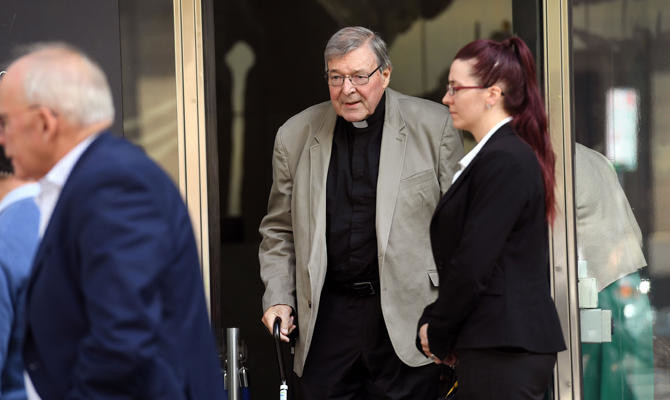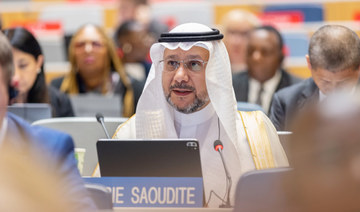MELBOURNE: “Guilty.”
There was a gasp in the Australian courtroom as the jury foreman read out the first verdict on child sex offenses against Cardinal George Pell, the Vatican’s treasurer, then stunned silence as the same word was repeated for each of the four other charges he faced.
The jury of eight men and four women unanimously agreed on Dec. 11, after a four-week trial, to convict Pell of five sexual offenses committed against two 13-year-old choir boys 22 years earlier in the priests’ sacristy of Melbourne’s St. Patrick’s Cathedral.
They reached their decision after hearing lengthy testimony from a victim, who described how Pell had exposed himself to them, and forced one boy to perform a sex act on him. That complainant still lives in Melbourne. The other victim died in 2014.
The trial and verdict could not be reported until now due to a court-imposed suppression order, as Pell was due to face another trial on older historical child sex offense charges and the judge did not want the next jury to be prejudiced. Those additional charges were dropped on Tuesday and the judge lifted the reporting restrictions.
Each of the five offenses carries a maximum 10 years in jail. Pell is due to be sentenced in early March, following a mitigation plea hearing on Feb. 27.
Pell, a burly 1.9 meters (6 foot and 3 inches) tall, had sat hunched in the dock at the back of the courtroom throughout the trial. He stared straight ahead when the jury foreman said “guilty” for the first time, then turned away.
As the next four verdicts were delivered, the man described by his own lawyer as the “Darth Vader” of the Catholic Church sat with his head bowed.
Pell, the No. 3 official in the Vatican hierarchy, is the most senior Roman Catholic cleric worldwide to be convicted of such offenses. His downfall brings to the heart of the papal administration a scandal over clerical abuse that has ravaged the Church’s credibility in the United States, Chile, Australia and elsewhere over the last three decades.
Pope Francis, leader of the world’s 1.2 billion Catholics, ended a conference on sexual abuse on Sunday, calling for an “all-out battle” against a crime that should be “erased from the face of the earth.”
Powerpoint defense
The December verdict followed a re-trial. Three months earlier, a first trial of the same offenses had ended in a deadlocked jury that left some jurors in tears.
Pell’s lawyer Robert Richter, a theatrical 72-year-old well-known in Australia after taking on the defense in some of the country’s most high-profile criminal cases, had been confident since the pre-trial hearings that this time he had a slam dunk defense.
Late in proceedings at the re-trial, Richter introduced a new witness, a fellow criminal barrister and former altar server, who had a possible alibi for Pell. The witness said he had served at a mass in late 1996 and afterwards he and his mother had chatted with Pell on the front steps of the cathedral, which the defense said meant he could not have been in the sacristy at the time of the alleged offenses.
But under cross-examination, the former altar server could not remember the exact date, and his recall of other details was vague and partly contradicted another defense witness.
Richter brought out Pell’s heavy ceremonial robes, trying to demonstrate they could hardly be maneuvered to expose himself to the boys as the prosecution had alleged.
He had his star witness, a priest who had helped Pell conduct services, demonstrate how elaborately and tightly knotted the robe was around the archbishop’s waist.
There was also debate over whether the wine that the boys were caught swigging in the sacristy by Pell immediately before four of the offenses took place was red, as the accuser said, or white, as the court heard was preferred by the dean of the cathedral at the time, as the defense tried to pick holes in the victim’s account.
For his closing argument, Richter rolled out a PowerPoint presentation with dozens of bullet points spelling out why, he said, it would have been almost impossible for the alleged events to have occurred.
He reminded the jury of Pell’s strenuous denials.
“What a load of absolute disgraceful rubbish. Completely false. Madness,” the jury heard Pell tell police in a recording of an interview in a hotel room near Rome airport in 2016 played earlier in the trial.
“You could scarcely imagine a place that was more unlikely for committing pedophilia crimes than the sacristy of the Cathedral after mass,” Pell, who did not testify at either trial, said in the recording.
Closed door testimony
The jury was unswayed, returning a verdict of guilty on all five charges after hearing a prosecution case based entirely on the evidence given by Pell’s surviving accuser.
That testimony was the crux of both trials.
Reporters, Pell’s supporters and abuse survivors who had filled the small court for most of the trial did not see or hear the complainant’s two-and-a-half days of testimony and cross-examination by Richter, which was conducted by video link for the jury behind closed doors. It was later outlined to the court in comments by the prosecutor.
In his closing argument to the jury, prosecutor Mark Gibson, in a quiet voice, called the accuser’s evidence “powerful and persuasive.”
“He was not a person indulging in fantasy or imagining things to the point where he now believed his own imaginative mind, but was simply telling it as it was and is,” Gibson told the court.
Pell had appeared relaxed through most of his trial. Every day he sat in the dock, usually wearing a white shirt with a clerical collar, black pants and a beige jacket, writing on a large notepad and taking occasional sips of water. During breaks in proceedings he would chat with supporters.
But in the nine months since pre-trial hearings began, Pell’s health had clearly deteriorated.
Judge Peter Kidd extended bail after Pell was convicted so he could have double knee surgery in Sydney on Dec. 14, which had been postponed after the first trial.
Pell’s lawyers will now be counting on an appeal filed last week to keep him out of jail.

























